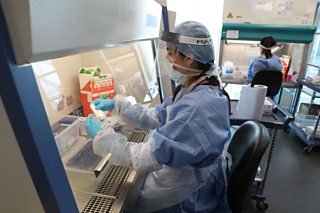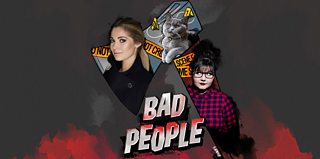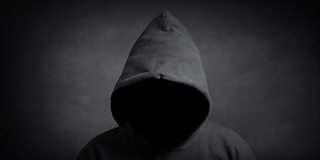When is spreading infectious diseases a crime?
Written by Dr Julia Shaw
The people who sit on the tube with their masks on their chins while coughing. The friend who has gone to work with a fever. You, downplaying your own COVID-19 symptoms on your way to the park to socialise with friends – it’s not so bad, it’s probably not COVID.
Alongside government guidelines which make certain behaviours unlawful during this pandemic, every one of us has also conceived of our own personal set of behavioural rules to follow. It is easy to view anyone who is stricter than us as being overly cautious, while anyone who is less strict we write off as irresponsible or harmful. But at what point does irresponsible become criminal? And, are those who recklessly spread COVID ‘bad people’?
These are two of questions that Sofie Hagen and I address on this week’s episode of the Bad People podcast on Βι¶ΉΤΌΕΔ Sounds. We discuss the case of German popstar Nadja Benaissa from the band No Angels, who was convicted of recklessly spreading HIV, and what her case can teach us about the legal and psychological approaches to reckless behaviour during both the HIV epidemic and the COVID pandemic.

What can we learn from HIV-related cases?
There are certain things that you cannot consent to, like having someone cut your leg cut off for no medical reason, or being stabbed and maimed. This was established back in 1994, in a case about sadomasochism called , which established that you cannot consent to intentional grievous bodily harm.

In 1994, a case about sadomasochism called R v Brown, established that you cannot consent to intentional grievous bodily harm."
The question of what people can consent to has been heatedly argued ever since, and arose again during the 2004 landmark case . A main question that this case raised was; can people consent to putting themselves at risk of catching a potentially deadly disease?
In a man who was HIV positive knowingly had unprotected sex with two women. The women later tested positive for HIV. Ultimately it was decided that, yes, the women could have consented to putting themselves at risk of catching HIV because it would not have been intentionally inflicted – Mr Dica had acted recklessly but did not intend to spread HIV. However, there was not enough evidence to show that they did in fact consent. As a result, Mr Dica was convicted of recklessly inflicting grievous bodily harm and was sentenced to four and a half years in prison.
The other landmark case was in 2005, . Konzani was told he had HIV, told of the risks of passing it on to sexual partners, and then had unprotected sex with three women anyway. He didn’t tell any of his partners that he was HIV positive. Here the question was; what did the women consent to? It was found that Konzani’s victims had consented to unprotected sexual intercourse, but did not consent to the risk of HIV. He was sentenced to ten years in prison.
From HIV to COVID
What do these two cases teach us? They teach us that people have been convicted of recklessly giving others infectious diseases. These cases might be about transmitting HIV, but they also shine a light on the sort of questions which might arise in COVID-related criminal cases.

The most common targets of assaults, including spitting and coughing, were emergency workers; 1,688 assault offences against frontline workers were charged."
For example, if someone has COVID and decides to go to the park with a friend, they might infect their friend, the bus driver and a stranger at the park. The question might then arise – in relation to each – about whether they consented to the risk. If the friend knew that the person had symptoms then they might have consented, but the bus driver and the stranger are highly unlikely to be regarded as consenting just by doing their job or by going to the park.
The next question is the extent to which we condemn the person with COVID going to the park; have they acted reprehensibly? Should they be criminalised? Does your opinion change if the person wasn’t going to the park, but was going to work and couldn’t afford to take the time off?
These may still be hypothetical questions, but we know that a number of people have already been prosecuted for COVID-related assaults. According to Crown Prosecution Service statistics released in January 2021 that looked back at what happened in 2020, almost 6,500 offences related to COVID were prosecuted between 1 April and 30 September 2020.
The most common targets of assaults, including spitting and coughing, were emergency workers; 1,688 assault offences against frontline workers were charged. Many of these involved police officers being coughed and spat on by someone who said they had COVID, and others were kicked, bitten and hit with heavy objects after stopping suspected COVID rule-breakers.
I find it hard to sympathise with anyone who intentionally spits or coughs at someone else, I find it even harder to sympathise with someone with COVID doing this. Yet, I still have to wonder whether criminalising this behaviour really the answer to get this kind of reckless transmission to stop.
Is criminalising the transmission of infectious diseases a good thing?
Campaigners have taken issue with the rulings in both R v Dica and R v Konzani for a number of reasons. One reason is that having HIV is already stigmatised, and criminalisation of transmission can lead to even more stigmatisation. Another reason is that criminalising such acts can also make it less likely for people to disclose their infection status for fear of being prosecuted. Both of these we also need to take into consideration in the context of COVID.

Why do people behave recklessly in the first place?"
There’s also another important question; why do people behave recklessly in the first place? When asked why she didn’t tell her partners that she had HIV before engaging in unprotected sex with them, our German Popstar Nadja Benaissa responded that she was having fun and was thinking selfishly. She is also cited in as having said:
"It all happened very quickly. Afterwards, I was too scared to say anything. It was a vicious circle of keeping quiet, fear and denial. I talked myself into believing nothing would happen. Then I discovered a few years later that something did happen… And it was too late."
I think we can all learn from this. Not just that there are legal consequences to being reckless about infectious diseases, but that it’s easy to engage in psychological gymnastics to allow ourselves to still feel good when we behave badly.
To learn more about Benaissa’s case and the psychology behind why we are so keen to find someone to blame during an epidemic like HIV or a pandemic like COVID, listen to episode “21. No Angel” of Bad People on Βι¶ΉΤΌΕΔ Sounds.
Bio
Dr Julia Shaw is a research associate at University College London and the co-host of the Bad People podcast on Βι¶ΉΤΌΕΔ sounds.
She is an expert on criminal psychology, and the author of two international bestsellers “Making Evil: The Science Behind Humanity’s Dark Side” and “The Memory Illusion: Remembering, Forgetting, and the Science of False Memory.
Her website: www.drjuliashaw.com, and twitter




